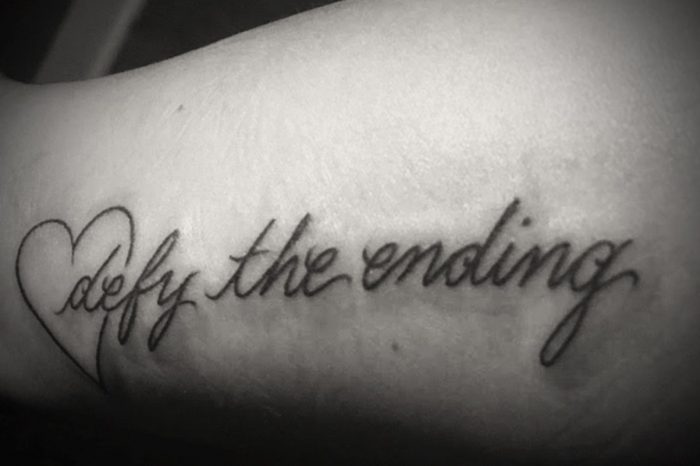Twenty years ago, I fell in love.
It wasn’t one of those picture-perfect, everyone is so excited for you kinds of love. It was an “Oh, sh*t, I am going to have to tell my parents I can’t live without this person” kind of love. (Needless to say, that conversation did not go splendidly.)
We were incredibly mismatched. I was 10 years older and had been briefly (and horribly) married before. We were drawn together through music: I was a pianist and he was a singer. We made really great music together. I loved his creative, impulsive, try anything view of the world. I felt awake and alive.
The first two months were everything that being crazy in love can be. Laughter, joy, sex, more sex, even more sex. We were the air we breathed and we ignored anyone who didn’t believe in the magical power of our love to overcome any obstacle.
The next nine months would change the course of both of our lives forever.
We stayed together, and got married when our first son was two and a half. Our second son came a year later. We both got jobs as teachers; we bought a house in the suburbs; we had a dog; we took family vacations; we fought and we laughed. We stayed together through loss—miscarriages, death, layoffs, and his parents’ divorce. We stayed together through challenges—ADHD, anxiety, depression, debt, more debt, not much time together, and little or no sex.
When we celebrated our 15th wedding anniversary, even my father said, “Well, I never thought you would make it this far, but happy anniversary.”
As our oldest son graduated from high school and my parents celebrated their 50th anniversary, I was feeling pretty accomplished. Work, marriage, family, house—it all looked like we had beat the odds.
So, when my husband told me he didn’t want to be married to me anymore, it took me to my knees.
The dissolution of a marriage is like ripping your liver out of your body without any anesthesia. It is painful for everyone involved—even those who are watching from the outside. I had always thought of myself as a pretty strong person. I have a leadership role in my job. I manage a great deal of responsibility. I am not easily shaken.
But this was different. I couldn’t make sense of what was happening in the context of the rest of my life. It was like I didn’t know who I was—nothing felt real. I suddenly felt like I wasn’t strong enough at all.
The pain and the grief was overwhelming. And at that point, a dear friend told me to just try and get through five minutes.
She said I needed to be kind and compassionate to myself and look at getting through five minutes as a win. At first, I thought there was no way that would help. I needed something that would help me get back to being me—the me that had everything under control. And then I tried to just be present for five minutes and get through it.
I started thinking about my whole life in terms of five minute increments: stand up, get a drink of water, hug my son, pet the dog, make it through five minutes. Then I’d set a new goal for the next five minutes.
The divorce was ugly. My life turned upside down and I felt like I was drowning. I held on to five minutes at a time like a life raft that could help me get to the shore. As I got stronger, adding five minutes to five minutes became a series of concrete routines—yoga, walks, journal, going to work, counseling, family. I lived five minutes to five minutes, routine to routine.
When I felt like I was losing everything, I held on to the breath—and breathing helped me to come back to the present and move through the pain.
Being mindful of each five minutes might sound impossible when you are wrapped in grief. But, that is exactly when we need to slow down and be present. These five minute routines help us to feel rooted in the things that ground us. During our lowest times, it can be nearly impossible to think about caring for ourselves, but taking just five minutes to practice self-care can be a powerful first step.
Mindfulness can help to bring us into the present, reduce anxiety and fear of the unknown, and recognize our needs.
I had never thought about “self-care” before. I hadn’t separated my work self and my home self. I did not care for my marriage as a separate entity that needed time, attention, and nurturing.
Losing what I thought defined my life actually helped me to find myself, to be present and aware of myself, my needs, and how I care for those people I am in relationship with. Mindfulness helped me show my kids what love, commitment, strength, and perseverance really look like—even in the face of loss and grief. We didn’t choose this path, but we will follow where it leads with strength and grace.
Brené Brown has become one of my favorite writers. She is so real and inspiring.
In her book, Rising Strong, she says, “Our job is not to deny the story, but to defy the ending—to rise strong and rumble with the truth.” That line meant so much to me as I struggled that I got “defy the ending” tattooed on my arm.
No one else can write my story. I have to show up—flaws and all—be mindful, and follow my path, wherever it may lead, just five minutes at a time.
~












Read 0 comments and reply